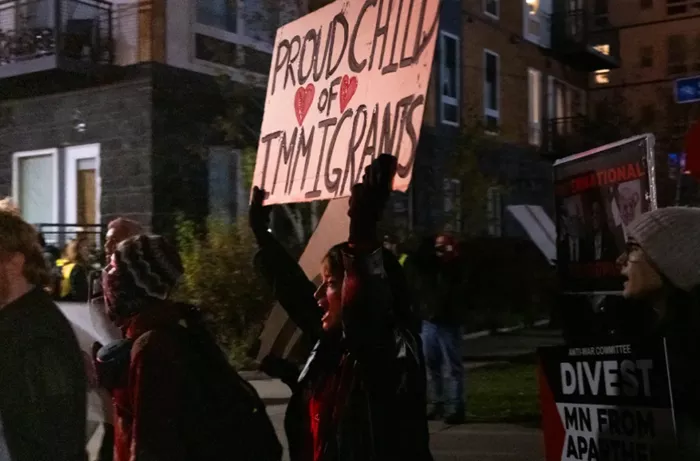Since former President Donald Trump’s re-election this week, undocumented workers in the Twin Cities have expressed a mixture of fear and frustration. Edwin, an undocumented Ecuadorian laborer who waits for work on Lake Street, says many of his colleagues are afraid they might face deportation if Trump pushes forward with his promises. Meanwhile, day laborers with green cards have shown support for Trump, citing concerns over the increasing competition for limited jobs.
Immigrant rights and legal groups in Minnesota, who have seen an uptick in calls from anxious immigrants, are now ramping up efforts to protect their communities. Trump’s campaign included pledges to carry out the largest deportation operation in U.S. history, eliminate the Deferred Action for Childhood Arrivals (DACA) program, and reduce the use of Temporary Protected Status (TPS), which allows immigrants from unsafe countries to live and work in the U.S.
As the uncertainty grows, Minnesota immigrant rights groups are preparing for what they fear could be a new wave of anti-immigrant policies. They are focusing on educating immigrants about their rights, organizing legal teams to prevent deportations, and advocating for state-level protections like the North Star Act.
Anxiety at the Corner
Edwin, 37, has been waiting for work on the sidewalk at a spot known as “la parada” near Interstate 35W. He has started the asylum process and hopes it will shield him from potential deportation. However, many others at the corner are not so fortunate and worry daily about being sent back to their home countries.
“There’s a lot of fear here because they don’t know if they’ll be deported,” Edwin said.
On the day Trump’s re-election was confirmed, Ma Elena Gutierrez, executive director of Fe y Justicia, a nonprofit that provides legal help and healthcare to immigrant workers, was flooded with calls from worried immigrants. She reassured them that the organization would continue advocating for their rights.
“There are a lot of exaggerated measures that we fear he will implement,” Gutierrez said. “His rhetoric always attacks immigrants.”
Fe y Justicia’s work is focused on educating immigrant workers about their rights and offering assistance, including helping undocumented individuals obtain driver’s licenses. The group has also formed rapid response teams to respond to deportation threats.
The Fear of Deportation
Gutierrez recalls the fear in the community during Trump’s first presidency, when U.S. Border Patrol raids left many immigrants terrified, and their children were also impacted by the climate of fear. In response, the group has been working to calm these fears and remind the community of their legal rights.
Pablo Tapia, executive director of the Asamblea de Derechos Civiles (ADDC), said that fear was palpable the day after the election, but he also saw moments of hope. Tapia helped a group of immigrants take the Minnesota driver’s license test, and six out of seven passed. He said some of them cried with relief.
Tapia is focused on reaching out to newcomers, who may not know their rights or how to navigate potential changes. “We have to be proactive, creative, and fearless,” he said.
Reassurance and Vigilance
Despite the uncertainty about Trump’s next steps, immigration law experts are urging caution. Julia Decker, policy director at the Immigrant Law Center, reminded the community that, as of now, no new immigration laws have passed. While Trump has expressed intentions to roll back policies from his first term, Decker emphasized that the law has not changed yet.
“The immigration laws and processes have not changed, despite the election results,” Decker said. “It’s important to verify any information with a legal expert before making assumptions.”
Organizations like Mid-Minnesota Legal Aid are also planning educational sessions in the coming weeks to keep the community informed about their rights.
Preparing for Potential Backlash
Wendy Zúñiga, communications director for COPAL, a Latino advocacy group, believes Trump’s re-election will reignite fears based on past experiences with mass deportation threats. COPAL, like many other groups, is preparing to provide resources to counteract the psychological impact of this fear.
“People who harbor biases will see us all as the same,” said COPAL’s executive director, Francisco Segovia. “We are already seeing the effects of Trump’s rhetoric.”
While Trump’s re-election brings many uncertainties, immigrant rights groups in Minnesota are determined to push for change at the state level. If Democrats retain control of the Minnesota House, activists will push to pass the North Star Act, which aims to make Minnesota a sanctuary state and limit cooperation with federal immigration authorities.
“We need to make protecting immigrants a top priority at the state level,” said Erika Zurawski of the Minnesota Immigrant Rights Action Committee (MIRAC). “Without state-level protections, we could be vulnerable to federal actions.”
Moving Forward with Solidarity
In the face of rising fear, immigrant rights groups are encouraging solidarity and proactive engagement. As the community prepares for what may come next, they are not backing down from their fight for justice.
“We have to stay strong together,” Zurawski said. “We can build a movement that makes it difficult for this government to carry out harmful policies.”
As Trump’s re-election shakes immigrant communities across the country, local organizations in Minnesota are determined to protect immigrant rights and push back against harmful rhetoric and policies, while educating and empowering those at risk.
Related topics:
- Immigrant Communities Fearful of the Impact of Trump’s Deportation Plan
- Immigrant Rights Groups Prepare to Fight Back Against President-Elect Trump’s Policies
- Trump Allies and Private Sector Brace for Widespread Immigrant


